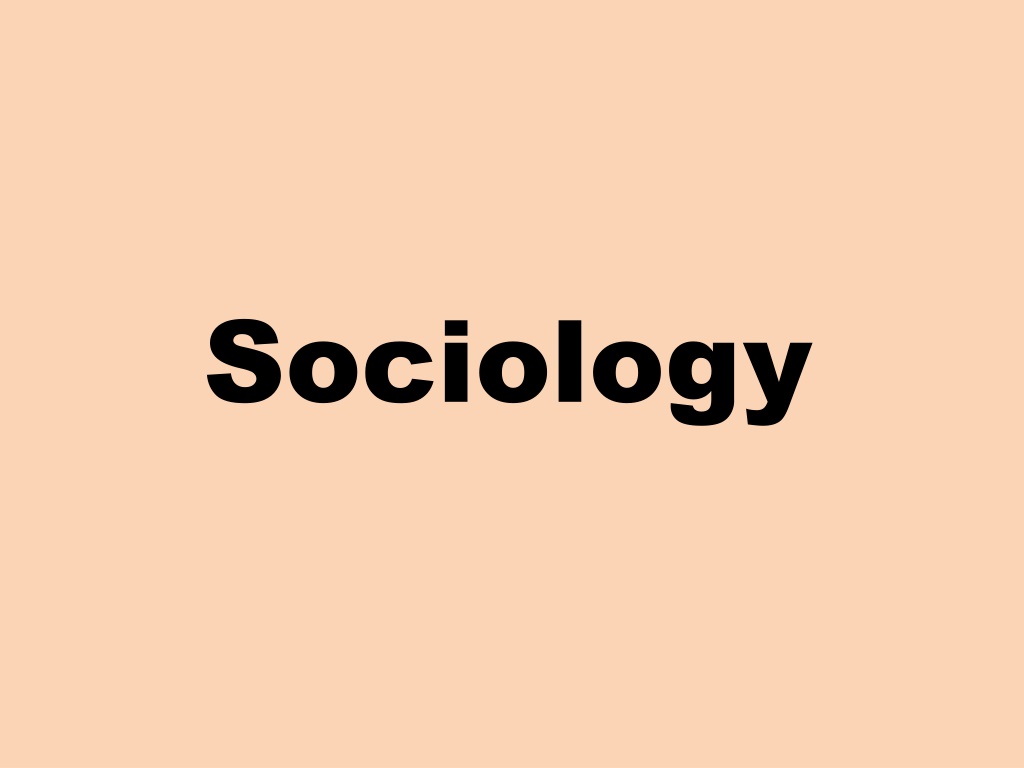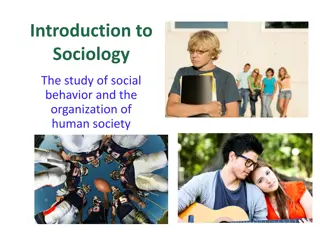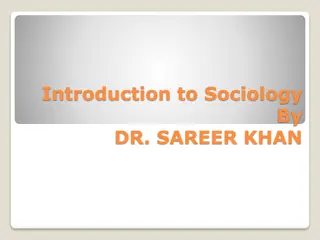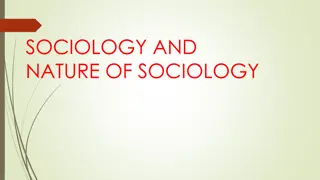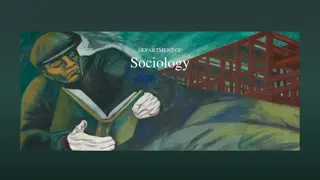Understanding Socialization Process in Sociology
Socialization is the process through which individuals learn societal norms, behaviors, and roles. It shapes one's personality and is essential for the functioning of society. The concept involves continuous learning and adaptation to various social groups and roles from infancy to adulthood, consisting of stages like the Oral, Anal, Oedipal, and Adolescence stages. Through socialization, individuals internalize group norms, develop unique selves, and acquire social skills necessary for interaction and integration within society.
Download Presentation

Please find below an Image/Link to download the presentation.
The content on the website is provided AS IS for your information and personal use only. It may not be sold, licensed, or shared on other websites without obtaining consent from the author. Download presentation by click this link. If you encounter any issues during the download, it is possible that the publisher has removed the file from their server.
E N D
Presentation Transcript
B.A. 1st Semester (Major) SOC UG 101 Basic Concepts in Sociology Topic : Socialization
THE CONCEPT OF SOCIALISATION Little of man s behaviour is instinctive. Rather, man s behaviour is learnt behaviour. The human child comes into the world as a biological organism with animal needs. He is gradually moulded in society into a social being and learns social ways of acting and feeling. The continued existence of society becomes impossible without this process. No individual could become the person and no culture could exist without it. This process of moulding and shaping the personality of the human infant is called Socialization .
Definition of Socialization 1.Socialization is the Process of working together, of developing group responsibility, or being guided by the welfare needs of others. - Bogardus 2. Socialization is the process by which the individual learns to conform to the norms of the group. W. F. Ogburn 3. Socialization is the process whereby one internalizes the norms of his groups, so that a distinct self emerges, unique to this individual . Horton and Hunt.
Socialization is a Continues Process Socialization is a process of inducting the individual into the social world. It consist in teaching culture which man must acquire and share. Socialization is social learning. This learning is not intermittent but continuous. Man belongs to different groups at different stages of his life. As these groups change, so man must learn new rules, new patterns of behaviour. Even though, we are members of family all our life, we are constantly changing our rules within it, acquiring new roles, dropping or modifying old ones. We begin as children, pass through adolescence into adulthood, marry, become parents, enter middle age, retire and grow old. With each role come new patterns of behaviour that we must learn. Thus, throughout our life, we are involved in the socialization process.
Stages of Socialization Socialization consists of four stages from infancy to adulthood. They are 1. The Oral Stage 2. The Anal Stage 3. The Oedipal Stage, and 4. The Adolescence Stage.
1. The First Stage - The Oral Stage This stage begins with the birth of the child and continues up to the completion of one year. For everything the child cries a great deal. By means of crying the child establishes its oral dependency. The child here develops some definite expectations about the feeding time. The child also learns to give signals for his felt needs. In this stage the child is involved in himself and his mother. For the other members of the family, the child is little more than a possession . Freud called this stage the stage of primary identification . It means the child merges his identity with that of the mother. The child only tries to establish some control over the hunger drive.
2. The Second Stage - The Anal Stage The second stage normally begins soon after the first year and is completed during the third year. It is here that the child learns that he cannot depend entirely on the mother and that he has to take some degree of care for himself. Toilettraining is the main focus of new concern. The child is taught to do some tasks such as toileting, keeping clothes clean, etc. The child in this stage internalizes two separate roles his own role and that of his mother. The child receives care and also love from the mother and learns to give love in return. The child is enabled to distinguish between correct and incorrect actions. The correct action is rewarded and the incorrect action is not rewarded but punished.
3. The Third Stage -The Oedipal Stage This stage mostly starts from the fourth year of the child and extends up to puberty (the age of 12 or 13 years). It is in this stage the child becomes the member of the family as a whole. It is here the child has to identify himself with the social role ascribed to him on the basis of his sex. According to Freud, the boy develops the OedipusComplex the feeling of jealousy towards father and love towards mother. In the same way, the girl develops the ElectraComplex the feeling of jealousy towards the mother and love towards the father. In this stage sufficient social pressures are brought on the child to identify with the right sex. Boys begin to be rewarded, for behaving like boys and girls are rewarded for acting like girls. After the age of six the child is able to understand the sexual difference. The boy tries to identify himself with the father and the girl with the mother.
4. The Fourth Stage -The Adolescence Stage The fourth stage starts with the period of adolescence. Due to the physiological and the psychological changes that take place within the individual this stage assumes importance. During this stage the boys and girls try to become free from parental control. At the same time they cannot completely escape from their dependence on their parents. In the modern society the parents intend to give more freedom to the boys and girls to do some of their activities independently. The parents try to lessen the open expression of their emotional attachment towards the adolescent children. They encourage them to select their line of education, their occupation and their life-partners. They expect the adolescent children to accept responsibility and learn new roles assigned to them. The adolescents thus learn new roles and new behaviour patterns and internalize new social norms associated with them.
Agents of Socialization Peers or Age Mates School and Teachers Agents of Socialization State (Government) Mass Media of Communi -cation Family and Parents Religion
Family and Parents The process of socialization begins for every one of us in the family. Here, the parental and particularly the maternal influence on the child is very great. The intimate relationship between the mother and the child has a great impact on the shaping of child s abilities and capacities. The parents are the first persons to introduce to the child the culture of his group. The child receives additional communications from his older siblings, i.e., brothers and sisters, who have gone through the same process with certain differences due to birth order and to the number and sex of the siblings.
Peers or Age Mates Peergroups means those groups made up of the contemporaries of the child, his associates in school, in playground and in street. He learns from these children, facts and facets of culture that they have previously learnt at different times from their parents. The members of peer groups have other sources of information about the culture their peers in still other peer groups and thus the acquisition of culture goes on.
School and Teachers The school is the second agency of socialization. In the school the child gets his education which moulds his ideas and attitudes. Education is of great importance in socialization. A well-planned system of education can produce socialized person. The teachers also play their role in socialization when the child enters the school. It is in the school that the culture is formally transmitted and acquired, in which the lore and the learning, the science and art, of one generation is passed on to the next. The communications they receive from their teachers help to socialize them and to make them finally mature members of their societies.
Mass Media of Communication Radio, Television, Newspapers etc., is also another source of socialization. The media of mass communication give us their messages. These message too contain in capsule form, the premises of our culture, its attitudes and ideologies.
Religion Religion has been an important factor in society for molding our beliefs and ways of life. In every family some or the other religious practices are observe on one or the other occasion. The child sees his parents going to the religious places and performing religious ceremonies. The child's listens to religious sermons which may determine his course of life and shape his ideas. Through religious code it can even control the behaviour of the individuals.
State (Government) State also works as a secondary agent of socialization. It makes laws for the people and lays down the modes of conduct expected of them. The people have to compulsorily obey these laws. If they fail to adjust their behaviour in accordance with the laws of the state, they may be punished for such failure. Thus, the state also moulds our behaviour.
Suggested Readings 1. Abraham, M. Francis, 2006, Contemporary Sociology : An Introduction to Concepts and Theories, Oxford University Press, New Delhi. 2. Giddens, Anthony, 2013, Sociology (7th Edition), Polity Press , Cambridge. 3. Johnson, Harry. M., 1973, Sociology, Allied Publishers, Bombay.
